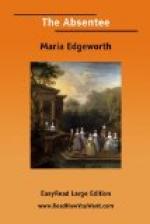At Lady St, James’s, and with her set, Lady Clonbrony suffered a different kind of mortification from that which Lady Langdale and Mrs. Dareville made her endure. She was safe from the witty raillery, the sly innuendo, the insolent mimicry; but she was kept at a cold, impassable distance, by ceremony—’So far shalt thou go, and no farther’ was expressed in every look, in every word, and in a thousand different ways.
By the most punctilious respect and nice regard to precedency, even by words of courtesy—’Your ladyship does me honour,’ etc.—Lady St. James contrived to mortify and to mark the difference between those with whom she was, and with whom she was not, upon terms of intimacy and equality. Thus the ancient grandees of Spain drew a line of demarcation between themselves and the newly-created nobility. Whenever or wherever they met, they treated the new nobles with the utmost respect, never addressed them but with all their titles, with low bows, and with all the appearance of being, with the most perfect consideration, anything but their equals; whilst towards one another the grandees laid aside their state, and omitting their titles, it was, ‘Alcala-Medina-Sidonia-Infantado,’ and a freedom and familiarity which marked equality. Entrenched in etiquette in this manner, and mocked with marks of respect, it was impossible either to intrude or to complain of being excluded.
At supper at Lady St. James’s, Lady Clonbrony’s present was pronounced by some gentleman to be remarkably high flavoured. This observation turned the conversation to Irish commodities and Ireland. Lady Clonbrony, possessed by the idea that it was disadvantageous to appear as an Irishwoman, or as a favourer of Ireland, began to be embarrassed by Lady St. James’s repeated thanks. Had it been in her power to offer anything else with propriety, she would not have thought of sending her ladyship anything from Ireland. Vexed by the questions that were asked her about her country, Lady Clonbrony, as usual, denied it to be her country, and went on to depreciate and abuse everything Irish; to declare that there was no possibility of living in Ireland; and that, for her own part, she was resolved never to return thither. Lady St. James, preserving perfect silence, let her go on. Lady Clonbrony, imagining that this silence arose from coincidence of opinion, proceeded with all the eloquence she possessed, which was very little, repeating the same exclamations, and reiterating her vow of perpetual expatriation; till at last an elderly lady, who was a stranger to her, and whom she had till this moment scarcely noticed, took up the defence of Ireland with much warmth and energy: the eloquence with which she spoke, and the respect with which she was heard, astonished Lady Clonbrony.




